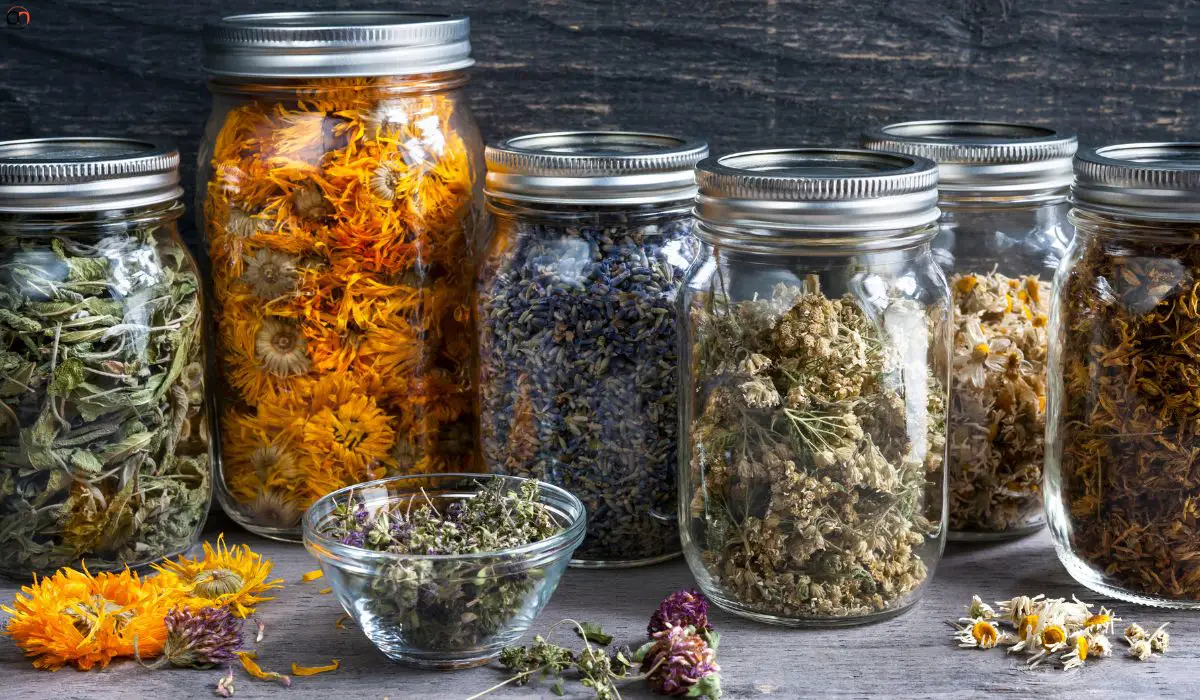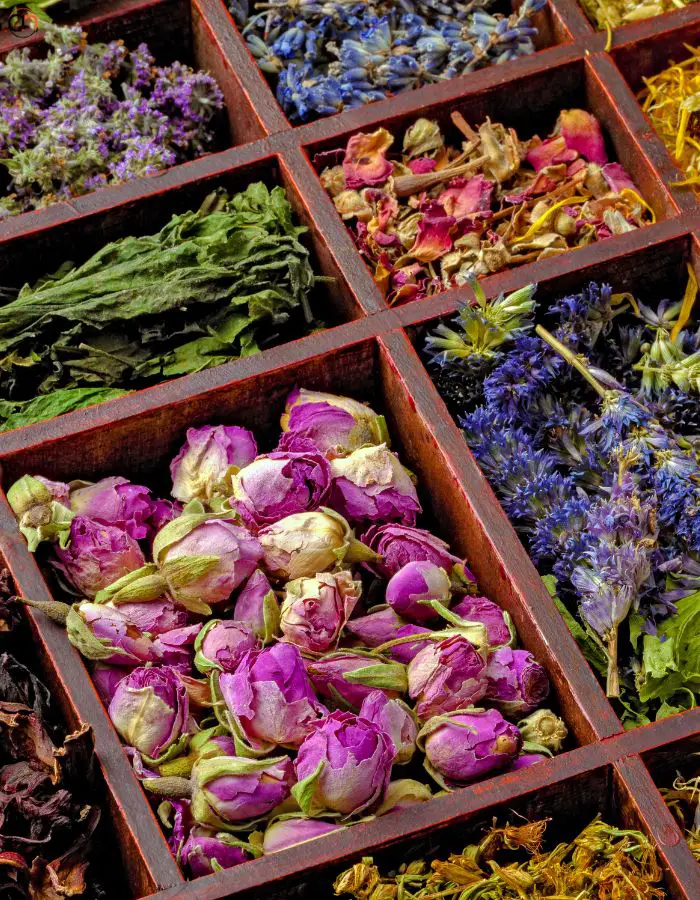Natural Herbs For Tea

There’s nothing quite as soothing as a warm cup of herbal tea, made from natural herbs packed with health benefits. Chamomile promotes relaxation, peppermint refreshes, and ginger aids digestion, each offering unique properties to enhance well-being.
Exploring the best natural herbs for tea reveals their incredible flavors and healing effects. Applying these herbs into daily routines creates a simple yet powerful way to support a healthy lifestyle.
Benefits of Herbal Tea:
Herbal tea is more than just a comforting drink—it’s a natural way to support overall health and well-being. Made from dried flowers, leaves, seeds, and roots, herbal teas provide a variety of health benefits without the caffeine found in traditional teas. Here’s how adding natural herbs for tea into your daily routine can improve your health:
1. Aids Digestion and Soothes the Stomach
Certain herbal teas, such as ginger, peppermint, and fennel, are known for their digestive benefits. They help relieve bloating, ease indigestion, and promote a healthy gut, making them ideal for after-meal consumption.
2. Strengthens the Immune System
Herbs like echinacea, elderberry, and turmeric are packed with antioxidants and anti-inflammatory compounds that help the body fight infections and boost immunity. Drinking these teas regularly can help prevent colds and flu.
3. Reduces Stress and Promotes Relaxation
Chamomile, lavender, and lemon balm are widely used for their calming effects. These herbs help relax the nervous system, ease anxiety, and improve sleep quality, making them perfect for unwinding after a long day.
4. Increases Energy and Enhances Mental Clarity
For a natural energy boost without caffeine, herbal teas like ginseng, rosemary, and peppermint can enhance focus, concentration, and mental alertness. They provide steady energy without the jitters or crashes of coffee.
5. Fights Inflammation and Supports Overall Health
Teas made from turmeric, hibiscus, and rooibos are rich in antioxidants that help reduce inflammation, fight oxidative stress, and support cellular health. Regular consumption may also contribute to youthful skin and a stronger immune response.
6. Supports Heart Health
Hibiscus and rooibos teas have been shown to help regulate blood pressure and cholesterol levels, promoting better circulation and cardiovascular health. Drinking these teas regularly may contribute to a healthier heart.
7. A Caffeine-Free Alternative to Traditional Beverages
Unlike coffee and traditional teas, most herbal teas are naturally caffeine-free, making them a great choice for relaxation and hydration. They provide a flavorful and beneficial option for those looking to reduce caffeine intake.
Note: Herbal teas offer a natural way to nourish the body, from strengthening immunity to promoting relaxation.
10 natural herbs for tea:
Herbal teas are a wonderful way to enjoy natural flavors while reaping numerous health benefits. From relaxation to digestion and immunity support, different herbs offer unique healing properties. Here are 10 natural herbs for tea, a healthy and refreshing cup of tea:
1. Chamomile – The Ultimate Relaxation Herb
Chamomile is known for its calming and sleep-inducing properties. It helps reduce stress, anxiety, and insomnia while also soothing digestive discomfort. A warm cup before bedtime can promote restful sleep.
2. Peppermint – A Digestive Soother
Refreshing and invigorating, peppermint tea is excellent for digestion. It relieves bloating, nausea, and indigestion while also providing a cooling sensation that helps refresh the mind.
3. Ginger – A Powerful Anti-Inflammatory
Ginger tea is widely used to reduce inflammation, soothe nausea, and boost immunity. It helps with digestion, relieves sore throats, and provides warmth during cold weather.
4. Hibiscus – A Heart-Healthy Choice
Hibiscus tea is packed with antioxidants that help lower blood pressure, support heart health, and promote radiant skin. Its tart, cranberry-like flavor makes it a delicious and refreshing choice.
5. Lavender – A Natural Stress Reliever
Lavender tea is well-known for its relaxing properties. It helps ease stress, reduce anxiety, and promote better sleep. It also has mild pain-relieving properties that can help with headaches.
6. Lemongrass – A Detoxifying and Refreshing Herb
Lemongrass tea is a natural detoxifier that helps flush out toxins, aids digestion, and boosts immunity. Its light citrusy flavor makes it a refreshing and uplifting tea choice.
7. Rooibos – A Caffeine-Free Antioxidant Powerhouse
Rooibos tea, native to South Africa, is rich in antioxidants and minerals. It supports heart health, improves skin, and provides a naturally sweet flavor without caffeine.
8. Echinacea – An Immunity Booster
Echinacea tea is often used to strengthen the immune system and fight off colds and infections. It helps reduce inflammation and supports overall wellness, especially during flu season.
9. Dandelion – A Liver Detoxifier
Dandelion tea is a natural detoxifier that supports liver health, aids digestion, and promotes healthy skin. It has a slightly bitter taste that pairs well with honey or lemon.
10. Sage – A Brain-Boosting Herb
Sage tea is packed with antioxidants and is known for improving memory, reducing inflammation, and soothing sore throats. It has a slightly earthy and peppery taste that enhances mental clarity.
Try experimenting with different herbs to find your perfect blend!
How to Prepare Herbal Tea at Home:
Brewing herbal tea at home is simple and allows you to customize flavors and benefits to suit your needs. Whether using fresh or dried herbs, the right preparation method ensures you get the most out of each cup. Here’s a step-by-step guide to making the natural herbs for tea at home.
1. Choose Your Herbs
Select herbs based on their benefits and flavor. You can use a single herb or create a blend for a more complex taste and enhanced health benefits. Some popular choices include:
- Chamomile – Calming and aids sleep
- Peppermint – Refreshing and supports digestion
- Ginger – Anti-inflammatory and soothes nausea
- Hibiscus – Rich in antioxidants and supports heart health
- Lavender – Reduces stress and promotes relaxation
2. Use Fresh or Dried Herbs
- Fresh Herbs: Use about 2 tablespoons of fresh leaves, flowers, or roots per cup of water.
- Dried Herbs: Use 1 teaspoon of dried herbs per cup of water, as they are more concentrated than fresh herbs.
3. Boil the Water
- Use filtered water for the best taste.
- Bring the water to a boil, but avoid overboiling, as extremely hot water can destroy delicate herbal compounds.
- Some herbs, like green rooibos and chamomile, brew better with slightly cooler water (around 190°F or 88°C), while others like ginger or echinacea benefit from boiling water (200°F or 93°C).
4. Steeping Time
- Flowers & Leaves (e.g., chamomile, peppermint, hibiscus) – Steep for 5–7 minutes.
- Roots & Barks (e.g., ginger, dandelion, cinnamon) – Simmer for 10–15 minutes to extract the full flavor and benefits.
- Blended Teas – Adjust steeping time based on the dominant ingredient.
5. Strain and Serve
- If using whole herbs, strain the tea with a fine-mesh strainer or tea infuser before drinking.
- Add natural sweeteners like honey, lemon, or cinnamon if desired.
- Serve hot or let it cool for a refreshing iced tea option.
6. Experiment with Herbal Blends
Create your own tea blends by combining different herbs for unique flavors and health benefits. Some great combinations include:
- Relaxation Blend: Chamomile + Lavender + Lemon Balm
- Digestive Support: Peppermint + Ginger + Fennel
- Immune Booster: Echinacea + Hibiscus + Lemongrass
Making herbal tea at home is a simple and rewarding way to enjoy natural flavors and health benefits. Enjoy your homemade herbal tea as a daily wellness ritual!
Read Next: Mango Tea
Take Away:
Herbal tea offers a natural way to relax, boost immunity, aid digestion, and support overall well-being. From calming chamomile to invigorating peppermint and antioxidant-rich hibiscus, each herb provides unique health benefits.
Making herbal tea at home is easy—choose fresh or dried herbs, steep them properly, and enjoy a soothing, flavorful drink tailored to your needs.
Start exploring different herbal blends to enhance your health and daily routine. Have a favorite herbal tea recipe? Share it with us!
Join us on Pinterest for more herbal tea tips, recipes, and wellness inspiration!
FAQs:
Q. what is the best herbs for tea garden?
The best herbs for a tea garden include chamomile, mint, lemon balm, lavender, hibiscus, and rosemary. These herbs are easy to grow and offer a variety of flavors and health benefits.
Q. what is the good dried herbs for tea?
Yes! Dried herbs are great for tea because they have a more concentrated flavor and longer shelf life. Store them in an airtight container to maintain freshness.
Q. How do I dry fresh herbs for tea?
Hang fresh herbs upside down in a dry, dark place for 1–2 weeks, or use a dehydrator for faster drying. Once fully dried, store in airtight jars.
Q. How long should I steep herbal tea?
Most herbal teas should steep for 5–10 minutes, but tougher herbs like roots and bark may need 10–15 minutes for full extraction.
Q. What’s the best way to store dried tea herbs?
Store dried herbs in a cool, dark place in airtight glass jars or tins to prevent moisture and preserve potency.
Q. Can I mix different herbs for tea?
Absolutely! Mixing herbs creates unique flavors and enhanced health benefits. Try chamomile + lavender for relaxation or peppermint + ginger for digestion.






